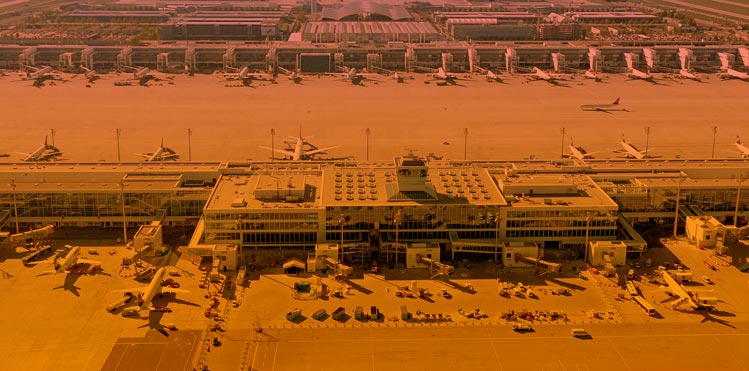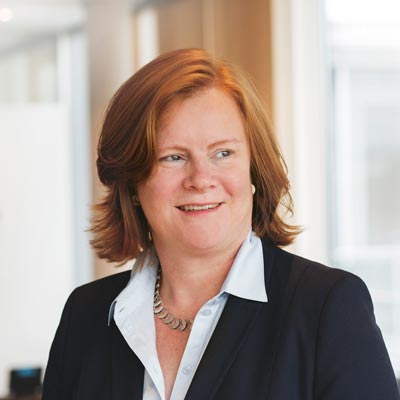
Andrea Gebbeken joined Munich Airport’s management team in October as a third Managing Director, alongside Dr Michael Kerkloh and Thomas Weyer. She spoke to Ross Falconer just a few weeks into her new role.
Munich Airport’s management team has a new look with the appointment of Andrea Gebbeken as a third Managing Director. She brings extensive experience in aviation and logistics, including six years as CEO of Tirana International Airport. Immediately prior to joining Munich Airport, she headed the north German operations for DB Station und Service AG, the services arm of the German railways.
In her new role, Gebbeken is responsible for end customer business, corporate security, and quality and project management. Speaking to Airport Business a month into the position, she described her initial priorities as to “be curious; meet colleagues, co-workers and stakeholders; become acquainted with the airport, its assets, infrastructure and corporate strategies; absorb the culture and the values of FMG represented by its brand “Munich Airport: living ideas – connecting lives”; deepen the knowledge of specifics and dynamics of the business units I am responsible for, their market position, their potential, their opportunities and challenges.”

Andrea Gebbeken, Managing Director, Munich Airport: “The consistent development of Munich Airport’s position as an international hub and an attractive marketplace, its valued brand image as an innovation location with a distinctive Bavarian charm, as well as its top brand mix, quality services, extraordinary events and advertising are key factors in its success, and also the main challenge for the future.”
While Tirana (2 million passengers) is a much smaller airport than Munich (41 million), the issues they have to deal with are very similar, and the same is true of DB Station und Service AG. The obvious commonalities are that they are all part of the transport sector with its associated regulation, extension programmes, and public interest; as well as the increasing importance of the non-traffic related side of the business, including rental/concessions, parking, advertising, etc.
“My prior positions serve as a treasure trove of experience for me, and deliver comparisons and benchmarks,” Gebbeken comments. “Furthermore, having worked in different companies and jurisdictions with numerous private and public shareholders and stakeholders has sharpened my intercultural competence, which is always useful when starting somewhere new.”
Gebbeken joins at a time of continued growth. Munich Airport handled a record 41 million passengers in 2015, and the first three quarters of 2016 saw a further record with 32.2 million passengers. The forecast for the year as a whole is a 4% increase to 42 million. Her key responsibilities are three-fold:
End customer business
“The consistent development of Munich Airport’s position as an international hub and an attractive marketplace, its valued brand image as an innovation location with a distinctive Bavarian charm, as well as its top brand mix, quality services, extraordinary events and advertising are key factors in its success, and also the main challenge for the future,” says Gebbeken. “In accordance with the forecast aviation development, this requires an appropriate development and expansion of related commercial infrastructure tailored to suit market needs, both locally on-campus and virtually and digitally.”
Corporate security
“Munich Airport is well-positioned, but faces perpetually new challenges due to new or modified directions and regulations,” Gebbeken explains. “Landside security, for example, has played an important role even before the terror attacks in Brussels and Istanbul. The airport operator, the state and national police, as well as the aviation safety/security authority, jointly evaluate the risks on a regular basis. In general, the airport authority becomes active when a potential risk is detected and takes practical, technical or organisational measures to mitigate damage or danger. Our goal is to ensure that passengers, visitors and business partners feel safe, secure and comfortable at all times and enjoy their stay at the airport.”
Quality and project management
“We at Munich Airport know that passengers and guests are people with different needs and wants,” Gebbeken comments. “Analysing today’s customers’ needs, as well as their behaviour in detail, combined with studying trends and traffic mix forecasts, is crucial for anticipating the expectations of tomorrow’s passengers. We use state-of-the-art systems for quantitative passenger experience monitoring and customer feedback management to derive measures for this purpose. In order to ensure that our processes are reliable and repeatedly of top quality, we have created a corporate project management office. It ensures that standardised tools and methods are used throughout the company and offers in-house consulting services where needed.”
Meanwhile, Munich Airport is also embracing digital communications to engage with travellers. Its “seamless travel concept” involves digital connectivity alongside the customer journey, whether that be through the smartphone app, the website featuring a new virtual tour of the airport, or the digital channels of its partner companies.
“More and more passengers communicate online with us through our different social media channels,” Gebbeken explains. MUC has 123,000 ‘likes’ on Facebook and 16,000 followers on Twitter.
“The mobile device has become a constant companion during travels and the digital development at airports has logically taken off for its journey into the future,” Gebbeken adds. “Services such as self-check-in or quick-boarding have already become common. In the past, our airport app used to be a simple information channel, whereas new developments turn towards ‘dialogue media’ communication with our passengers.”
Retail flair reflecting Bavaria and Munich
Gebbeken’s remit also includes over 40,000sqm of retail and food & beverage space. With the opening of the new satellite terminal this April, the airport introduced a new retail and dining concept. The satellite’s central area is meant to resemble the famous downtown “Viktualienmarkt” – a natural, light-filled market square where food stalls, restaurants and shops surround an open seating area. “This concept offers the local flair for which the airport is renowned,” Gebbeken enthuses. “In the retail shops our guests can find well-known brands whose roots are firmly entrenched in Munich, as well as traditional international premium brands.”
MUC’s retail subsidiary company eurotrade developed a new and innovative retail concept for all duty free areas in the satellite terminal. “The new brand “MyDutyFree” is independent and varies in design and assortment from other duty free suppliers,” Gebbeken adds. “It is strongly dedicated to our region – Bavaria and Munich. All other duty free areas at Munich Airport will gradually adopt this new premium concept.”
Further highlights are the recent opening of the brand-new FC Bayern Munich fan shop, while in 2017, the new “Sportalm” will open in Terminal 2’s public area. This will provide a rustic and cosy Alpine atmosphere, like a mountain hut. “Traditional Alpine decorations, a real gondola and deck chairs invite passengers to relax among mountain panoramas and rock walls. This unique concept is once again proof of our constant efforts to come up with new ideas for airport improvement,” Gebbeken concludes.
Andrea Gebbeken curriculum vitae
Andrea Gebbeken (49) began her career with Monitor Company GmbH in Frankfurt, where she worked as a Research Analyst from mid-1994 until mid-1997. From mid-1997 to mid-2007 she had diverse positions with HOCHTIEF AirPort GmbH, Essen – finally as Director Airport Development Management. From mid-2007 until mid-2013 she served as CEO of Tirana International Airport, before returning to HOCHTIEF as a Senior Project Manager for Mergers & Acquisitions from mid-2013 until early 2014. From the spring of 2014 until the autumn of 2016 she headed the north German operations for DB Station und Service AG in Hamburg, the services arm of the German railways. In October 2016 she joined Munich Airport as the Managing Director responsible for commercial activities and corporate security.







